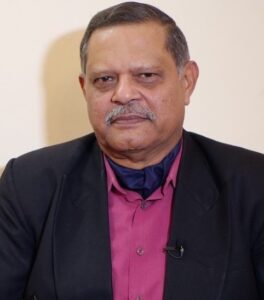The world has undergone much change in the name of development and progress, particularly over the past century. I think it is relevant to understand the fundamentals of the basic existential tenets of life and how ‘the self’ has come before ‘service’ or before ‘others’.
…The lockdown period and the many don’ts that we continued to follow subsequently have been an eye-opener, telling us that less is sufficient and that we had merely got used to excess in most things. Imagine, we had even got used to air pollution! Faced with a stay-home-or-risk-your-life situation, many of us fell back on what we had all but forgotten – our creativity and our instinct to find joys in the little things. Sure, there was restlessness, worry and fear, but these happened alongside a different sort of unravelling of our minds which made us see things we had forgotten to notice. Rainbows for example, or rivers and blue skies. The music that happens in nature when the sound of traffic dies out. There were reports of sightings of animals in our otherwise urban jungles.
Maybe these were signs that it wasn’t too late yet. Too late for what, some may be wondering. Well, too late to turn back the clock on an environmental disaster that has been in the making through the decades of decadence and will someday choke us human beings out of existence. Sure, it’s not going to be you and me or even our children, but what about their children and their children’s children? Does the possibility of their existence in a cold world not disturb us, or does it sound dystopian, the stuff of science fiction… Read the full introduction to the series here.
In an effort to understand what leaders at various organisations are doing towards making a sustainable world a reality, CauseBecause reached out to them and asked what they can do to make sustainable living a way of life and how do they see their role as individuals as well as leaders in organisations. The participants include:
Anirban Ghosh, Mahindra
Gayatri Divecha, Godrej
Rajiv Williams, Jindal Stainless
Ramji Raghavan, Agastya International
Rashmi Soni, Vistara
Shalini Singh, Tata Power
Vijay Sethi, Hero MotoCorp
Vikram Gulati, Toyota Kirloskar Motor
This thought is directly linked to individual responsibilities, responsibilities towards neighbours and towards the environment, and responsibility towards the businesses and work we are engaged in. I believe that we need to understand the rudiments of responsibility as embodied in the acronym I AM – that is, introspection, adoration and mutual respect.
If we truly ‘introspect’ on how we can improve the environment around our abode, the realisation will dawn that we have failed in our responsibilities over the years and should earnestly think about ‘what’ we need to do to change ourselves and our way of life. It is this driver which will lead to inner reflections on our habits and our lifestyles. Appreciation and ‘adoration’ of what we have and what we see around us will make us realise our responsibility towards preservation and help us to harmonise various actions like responsible consumption, responsible disposal, and responsible mutual understanding. This leads me to the third piece, mutual respect. Mutual respect is not limited to just another individual with whom we interact, but includes the environment as well. If we respect nature, then assuredly the converse will be visible.
There is a perceptible change in attitudes of people, with greater awareness being spread through various media. For example, do we really need to dispose of this, and if so, how? Such questions help us to, firstly, rethink on whether we need to procure a particular item, which may not be necessary, or if we have to purchase it, how do we optimally use and reuse it before we throw it away? Next, how do we dispose of it in a responsible way? Can we do with a little less and encourage local markets in producing quality products, which may be more expensive yet will have a direct impact on the lives of people through markets and in turn will create a healthier environment?
In sum, individual social responsibility has to flow from within. It is the small things that make a house a home – and our efforts must be on to make it happen, with passion and dedication.
“As leaders/decision makers
Leaders can make a significant difference to an institution, an organisation, or any group they represent by sharing their vision on collective responsibility. Firstly, we need to know our working environment, which is a critical component in decision making, where self-interests must always remain subdued to group interests and interests of all stakeholders. These stakeholders include the employees of the organisation, the supply chain, customers, government, communities, and so on. It is, therefore, important to assess a situation and blend the actions in such a manner that they are acceptable, sustainable, and stakeholder-driven.

Rajiv Williams is Corporate Head – CSR, Jindal Stainless Limited Group
A major initiative undertaken by JSL is to do with climate change and introduction of climate-resilient technology, resulting in reduction of carbon emissions. The process is presently work in progress and various initiatives have since been taken in the areas of reduction in power consumption. In addition, with detailed R&D various initiatives have been taken, like usage of liquid Fe-Cr, which again has facilitated in reducing power consumption, thereby further reducing carbon emissions. As per World Steel Association and International Energy Agency, with the various processes introduced by JSL, the corporation has been able to reduce 25,000 tons of CO2 emissions in 2018″19, which is a significant step towards CO2 mitigation. Efforts are on to reach further targets and be a leader in the space of environmental sustainability.
